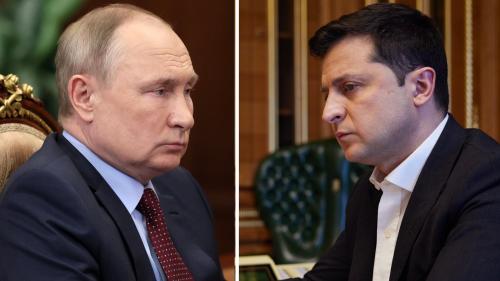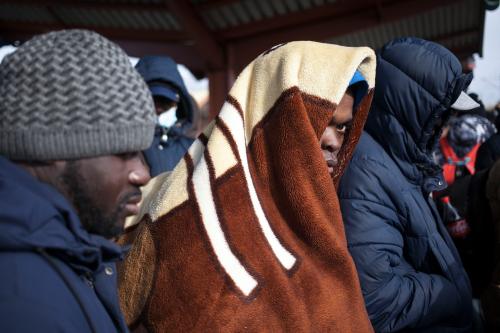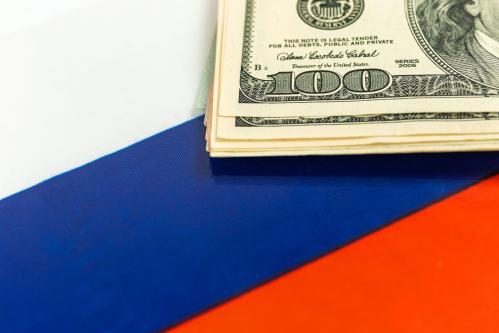Many of the world’s democracies are employing financial and economic countermeasures to oppose Russia’s latest invasion of Ukraine that began on Feb. 24. In the period since, these sanctions have come from the United States, the European Union, the United Kingdom, and other governments around the world at a dizzying speed, targeting a wide range of Russian government officials, oligarchs, citizens, banks, and corporations. They include many individuals and entities in Putin’s orbit who have long been the subject of scrutiny by anti-corruption analysts, activists, and authorities. The extent of the sanctions is staggering: It is the “most comprehensive set of multilateral economic sanctions ever applied to a major global economy.”
To analyze the scope and potential impact of these sanctions, it is essential to systematically monitor and track them—which is why we are launching the Brookings Sanctions Tracker. Following the invasion of Ukraine, civil society, the think tank community, the press, and many other stakeholders have expressed a need for consolidated information on what Russian individuals and entities are being sanctioned, by whom, and why. Tracking and aggregating these rapidly evolving and wide-ranging sanctions is a substantial undertaking. To help fill this gap, the Leveraging Transparency to Reduce Corruption Initiative at Brookings (a joint initiative with Results for Development) has launched a new tracker, working with Human Rights First and REDRESS, that consolidates sanctions against Russian individuals and entities into one central repository. The Brookings Sanctions Tracker is available here.
A multilateral approach to sanctions, including those we track, is valuable. Each sanction against a corporation or individual adds up, and more countries imposing sanctions against a target can increase the economic impact on the target. Although the sanctions are not fully comprehensive—most notably, excluding (at least at the moment) full European bans related to Russian oil and gas—they are devastating. They have, for instance, helped trigger a sweeping exodus of Western businesses from Russia, amplifying their effect. The objectives of the sanctions include, of course, driving Russia to a negotiated resolution of its hostilities.
The task the world’s democracies have set for themselves is not easy. Effectively sanctioning a nation as large and interconnected as Russia is difficult. Doing so while attempting to protect specific sectors (e.g., energy, food, and remittances for potential victims/refugees) is even more complicated. Assessments of sanctions’ effectiveness in prior settings are mixed, and there are substantial concerns about their consequences for civilians. What is indisputable is that identifying the scope, scale, and nature of sanctions can help us understand the stakes and the potential pressure points on the country being sanctioned. It can illuminate gaps to be filled and next steps to be taken.
Our goal is for this tracker to serve as a timely and user-friendly tool for all those who seek to analyze the current landscape of specific restrictive measures imposed against Russia (both on an individual nation basis and across the international community), generate analysis on trends, and inform recommendations on how to combat corruption, advance accountability, and defend democracy.
While the primary purpose of the sanctions is as a countermeasure to the invasion of Ukraine, their utility in other domains should not be neglected. Perhaps most prominent of these is the longstanding global campaign to combat corruption and the important role of Putin and his circle in that regard. Putin himself has been alleged to be one of the wealthiest—and perhaps the wealthiest—individuals in the world, and not owing to his official salary or holdings. Similarly, the activities, of his family members and affiliated oligarchs and other associates in exploiting Russian natural resources, business opportunities, and other enterprises have loomed large in the international debate over the nature and extent of corruption and its tentacles. They are felt not just within Russia, but throughout the EU and NATO countries and elsewhere around the world.
So in addition to addressing the invasion of Ukraine, significant swathes of the sanctions targeting Putin, his circle, and their institutional and individual enablers, whether in Russia or elsewhere, offer an opportunity to also drive forward the fight against corruption—an opportunity that many feel should have been seized by the world’s democracies long ago.
The United States, the European Union, and others have joined forces to help defend Ukraine against Russia through efforts in the economic domain. This unprecedented effort allows more states to participate in the defense of Ukrainian freedom. The Brookings Sanctions Tracker is a tool that maps these developments and can be used by analysts and stakeholders to identify gaps, analyze trends, and make recommendations to hold Russia accountable.
-
Acknowledgements and disclosures
The authors would like to thank Matthew Eitel for fact-checking and copyediting assistance on this piece. A list of acknowledgments for the sanctions tracker research is available here.
The Brookings Institution is committed to quality, independence, and impact.
We are supported by a diverse array of funders. In line with our values and policies, each Brookings publication represents the sole views of its author(s).













Commentary
Mapping financial countermeasures against Russian aggression: Introducing the Brookings Sanctions Tracker
March 14, 2022